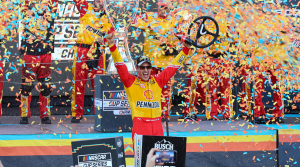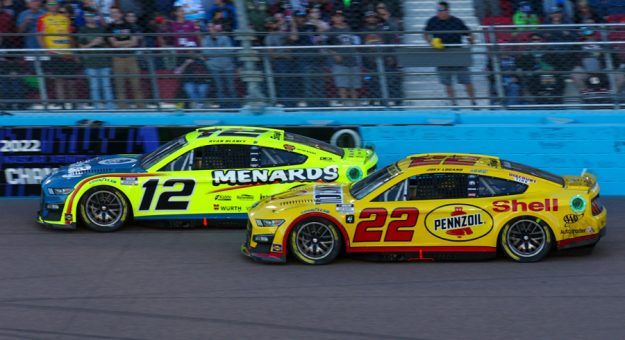Editor’s Note: NASCAR is celebrating its 75th anniversary. SPEED SPORT was founded in 1934 and was already on its way to becoming America’s Motorsports Authority when NASCAR was formed. As a result, we will bring you Part 75 of a 75-part series on the history NASCAR.
In a season of parity defined by unpredictability, it made sense that the NASCAR Cup Series champion would be a seasoned veteran.
It’s just a little bizarre, however, that the champion was Joey Logano. When no one was expecting it, Logano became the old guy in the room — among the crop of Championship 4 drivers and at Team Penske.
At 32, Logano bested Ross Chastain (29), Christopher Bell (27) and Chase Elliott (26) in dominant, almost boring fashion. He led 187 of 312 laps on the way to winning the season finale and the championship Nov. 6 at Phoenix Raceway.
Fifteen years after entering the Cup Series at age 18 and 10 years after joining Team Penske, Logano capped the first season of the Next Gen era by becoming the second (Kyle Busch) active Cup Series driver with multiple titles.
“My experience is valuable because I’ve been here a long time and I know how things work and I know how the sport works and all those type of things,” Logano said. “That’s all well and good. But I had to unlearn a lot of things when it came to the race car itself.”
He had to do it in Team Penske’s first full season since 2010 without Brad Keselowski under the organization’s roof. After Keselowski departed to join RFK Racing, Logano inherited his leadership role.
Even team owner Roger Penske said it was “hard to believe” that a decade had passed since Logano joined his organization.
“There was a lot of discussion (at the time about) was that the right move?” Penske said. “I have to thank Brad who talked to me about Joey and really made the opportunity for me to meet with him. He’s come on, you’ve seen his success. The number of races he’s won for us has been amazing.

“I said to him at the beginning of the year, with Brad leaving and he being the senior guy, to really put his arms around the whole team.”
Thanks to Logano’s victory in the opening Round of 8 race at Las Vegas Motor Speedway, the No. 22 team had a longer runway for its prep.
Following the victory at Las Vegas, crew chief Paul Wolfe didn’t want “to throw away” the following races at Homestead-Miami and Martinsville Speedways, but he “started focusing on Phoenix right after that win that next Monday and making sure we didn’t miss anything.”
The devotion to the mission led to Wolfe earning his second Cup Series championship as a crew chief. The first came in 2012 when he and Keselowski earned Team Penske its first Cup Series crown.
With a different driver and a “totally different car” to try to figure out, “racing is totally different in my eyes,” said the 45-year-old Wolfe.
“It’s almost like that happened in my second year in Cup racing,” Wolfe said. “It’s almost like I didn’t know better, didn’t understand how difficult it really was to compete for a championship in this series with the best teams and drivers.
“I’ve said this before, I’m not going to say I’m the smartest guy in the garage, but I like to put a lot of good people around me and make me look good, and we’ve definitely got that on this team and within our company.”
It was a season of parity during the first year for the Next Gen race car as 19 different drivers visited victory lane over the 36-race season. Logano parlayed four victories and 17 top-10 finishes into the championship.
Chastain, in his first season for Trackhouse Racing, won twice and authored 15 top-five finishes and 21 top-10 results, including a runner-up finish at Phoenix. Bell picked up three victories for Joe Gibbs Racing, including two during the 10-race playoff stretch. He had 20 top-10 finishes.
Driving for Hendrick Motorsports, Elliott won a series-best five races, but didn’t have the muscle he needed in the finale at Phoenix. Elliott, the 2020 series champion, also had 20 top-10 finishes.
Denny Hamlin won twice for JGR and wound up fifth in the standings, while William Byron also won two races and brought his Hendrick Chevrolet home sixth. Defending series champion Kyle Larson won three times and wound up seventh in the final standings for Hendrick Motorsports and winless Ryan Blaney brought his Team Penske mount home eighth.
Tyler Reddick won three times for Richard Childress Racing, but was eliminated during the first round of the playoffs, while Kevin Harvick won twice for Stewart-Haas Racing.
Single race winners were Chase Briscoe, Daniel Suarez, Austin Dillon, Kyle Busch, Alex Bowman, Erik Jones, Bubba Wallace, Chris Buescher and rookie Austin Cindric, who claimed the season-opening Daytona 500.
